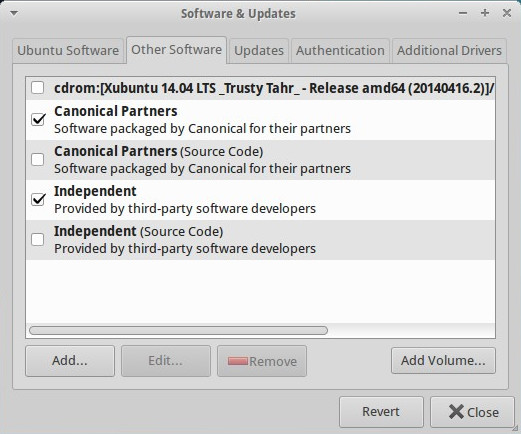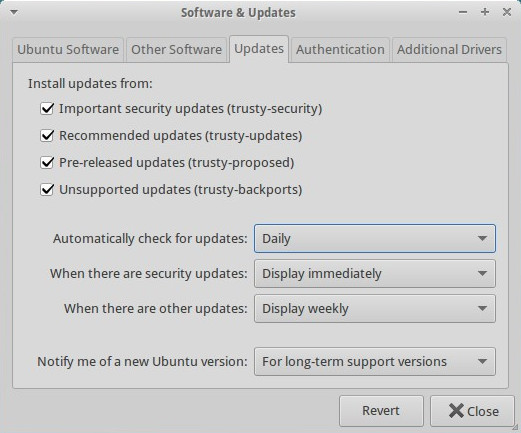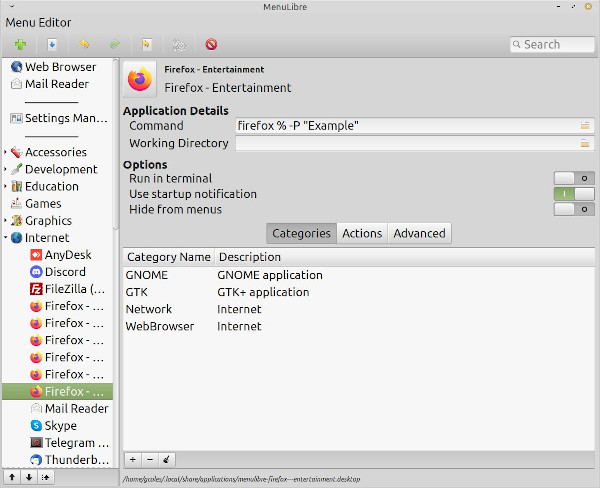Xubuntu
Do These Things After The Initial Install
Updating The System
sudo apt-get update sudo apt-get install aptitude sudo aptitude update sudo aptitude -y safe-upgrade
Once the updates have finished installing for completeness restart the system. Rebooting is not normally required in Linux but as this is the first update after installation it makes good sense to do so.
Software Updates
Normally after logging in for the first time the Software Update window should appear, close it. Then from the start menu open 'Terminal Emulator' and run the following:
sudo software-properties-gtk
Confirm your password and then from the new window select the second tab 'Other Software', alter the check boxes to match those show below.
Next select the 'Updates' tab alter the check boxes to match those shown below, the frequency of system automatically checking for updates can also be set as well.
When done click the 'Close' button.
You will then be presented with a new windows, click on the 'Reload' button and the system will update the software repositories and settings:
Remove Unwanted Software
There are two ways to remove software, either via the Software Centre or the terminal.
Method One:
- In the start menu type 'Ubuntu Software Centre' then click on the menu entry to open.
- Click on the 'Installed' icon.
Software To Remove
- AbiWord
sudo aptitude purge '~nabiword' sudo aptitude remove libgtkmathview0c2a
- Gmusicbrowser
- Gnumeric
sudo aptitude purge '~ngnumeric'
- Gigolo
- Orage
- Parole Media Player
- Transmission
Method Two
sudo apt-get remove -y abiword* gmusicbrowser gnumeric* gigolo orage parole transmission-*
Software To Install
CUPS - PDF
sudo aptitude install cups-pdf
LibreOffice
sudo add-apt-repository ppa:libreoffice/ppa sudo apt-get update && sudo apt-get install libreoffice libreoffice-gnome myspell-en-gb libreoffice-help-en-gb libreoffice-style-sifr sudo apt-get remove libreoffice-style-human hunspell-en-us
NotifyOSD
Customizable Notification Bubbles
sudo update && sudo apt install notify-osd
Mozilla Thunderbird
sudo apt-get install thunderbird-locale-en-gb sudo apt-get remove thunderbird-locale-en-us
Nemo - File Manager
sudo add-apt-repository ppa:webupd8team/nemo sudo apt-get update && sudo apt-get install nemo nemo-fileroller
Setting Nemo As The Default File Manager:
- Open the start menu
- Click on the 'All Settings' button (bottom of the start menu opposite the username)
- In the 'Personal' section click on 'Preferred Applications'
- Select the 'Utilities' tab
- Click on the arrow at the end of Thunar under 'File Manager'
- Click the browse button (which should open in /usr/bin/ if not browse to it) and select 'nemo'
- Click 'OK' twice then if you have finished 'Close'
NOTE: It is not advisable to remove Thunar file manager as it relies on the xubuntu-desktop which would also be removed. Removing xubuntu-desktop would prevent the OS from being upgraded to a newer distribution release in the future.
VLC
VLC is a free and open source cross-platform multimedia player and framework that plays most multimedia files as well as DVD, Audio CD, VCD, and various streaming protocols.
Open a terminal and type:
sudo add-apt-repository ppa:videolan/stable-daily sudo apt-get update && sudo apt-get install vlc
HOWTO: FIX
No Mouse After Lock Screen
CTRL+ALT+F1 CTRL+ALT+F7
HOWTO: DISABLE:
Mlocate
sudo chmod -x /etc/cron.daily/mlocate
Thanks - http://askubuntu.com/questions/268130/can-i-disable-updatedb-mlocate
HOWTO: MODIFY:
Keyboard Shortcuts
Cycle Windows For The Same Application
You can cycle between all open windows using ALT+Tab, but if you have multiple instances of a particular programme open you may just want to cycle between only those. There is a default of Super+Tab (Super being the left Windows key) but this does not appear to work. So to alter the keyboard combination:
Whisker menu - Settings Manager - Personal - Window Manager - Keyboard (tab) - Switch windows for same application (Action)
- Highlight and click the edit button, select your desired combination, click the close button.
I used ALT+¬ (¬ being the Grave accent key next to the number 1 key) as this is the same combination for Unity & Gnome.
Whisker Menu Launch Combination
Whisker menu - All Settings - Hardware - Keyboard - Application Shortcuts (tab)
- In the 'Command' column locate the entry 'xfce4-popup-whiskermenu', double click on the entry in the opposite 'Shortcut' column.
- A pop-up windows will appear asking you to select you new keyboard combination, on doing so the windows shuts
- Close the 'Keyboard' windows.
I used the Super (left hand Windows key) as this is the same for Unity and Microsoft Windows.
Whisker Menu
Alter Menu Panel Appearance
- Right click on icon, select on 'Properties'
- Under 'Panel Button' - 'Display:' - Select 'Icon & title' from drop down menu
Add Shortcuts For Individual Profiles For Mozilla Firefox And Thunderbird
NOTE: For this to work, you must have already created the new profile you will be linking to.
- Open Menu Editor/MenuLibre
- Select and expand the section where you want the new launcher to reside
- Click the + button in the top left-hand corner
- Alter the icon, entry name and description
- Under 'Application Details > Command' enter the details of the programme and profile to launch:
firefox % -P "Example"
- Under 'Categories' add the entries mirroring those of the default entry (as shown in the above image)
- Press 'Save'
Further Tweaks
https://sites.google.com/site/easylinuxtipsproject/first-xubuntu
Downloads
Nvidia Drivers
sudo apt-add-repository ppa:ubuntu-x-swat/x-updates sudo apt-get update && sudo apt-get install nvidia-current
SiS Drivers
https://gist.github.com/fevangelou/46a2885233c45011ad5c8752f18eac73



